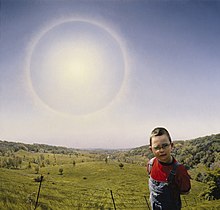Susanne Langer
表示

Susanne Katherina Langer (20 December 1895 – 17 July 1985) was an American philosopher of art, remembered for her 1942 book Philosophy in a New Key.
Quotes
[編集]
Philosophy in a New Key (1942)
[編集]- Philosophy in a New Key (New York: Mentor Books, 1948)
- The way a question is asked limits and disposes the ways in which any answer to it—right or wrong—may be given.
- Ch. 1, p. 1
- If we would have new knowledge, we must get us a whole world of new questions.
- Ch. 1, p. 10
- The men in the laboratory [...] cannot be said to observe the actual objects of their curiosity at all.[...] The sense data on which the propositions of modern science rest are, for the most part, little photographic spots and blurs, or inky curved lines on paper.[...] What is directly observable is only a sign of the "physical fact"; it requires interpretation to yield scientific propositions.
- Ch. 1, pp. 15–16
- Common-sense knowledge is prompt, categorical, and inexact.
- Ch. 10, p. 216
- It is the historical mind, rather than the scientific (in the physicist's sense), that destroyed the mythical orientation of European culture; the historian, not the mathematician, introduced the "higher criticism," the standard of actual fact. It is he who is the real apostle of the realistic age. Science builds its structure of hypothetical "elements" and laws of their behavior, touching on reality at crucial points.[…] But the historian does not locate known facts in a hypothetical, general pattern of processes; his aim is to link fact to fact, one unique knowable event to another individual one that begot it.
- Ch. 10, p. 225
Feeling and Form (1953)
[編集]- Feeling and Form: A Theory of Art (New York: Charles Scribner's Sons, 1953) 431 pp
- Philosophical questions are not by their nature insoluble. They are, indeed, radically different from scientific questions, because they concern the implications and other interrelations of ideas, not the order of physical events; their answers are interpretations instead of factual reports, and their function is to increase not our knowledge of nature, but our understanding of what we know.
- Ch. 1, p. 6
- Music is the tonal analogue of emotive life.
- Ch. 1, p. 27
- Art is the creation of forms symbolic of human feeling.
- Ch. 3, p. 40
- Tragedy dramatizes human life as potentiality and fulfillment. Its virtual future, or Destiny, is therefore quite different from that created in comedy. Comic Destiny is Fortune—what the world will bring, and the man will take or miss, encounter or escape; tragic Destiny is what the man brings, and the world will demand of him. That is his Fate.
- Ch. 19, p. 352
Philosophical Sketches (1962)
[編集]- Philosophical Sketches (Baltimore, Md.: The Johns Hopkins University Press, 1962), 190 pp
- The arts objectify subjective reality, and subjectify outward experience of nature. Art education is the education of feeling, and a society that neglects it gives itself up to formless emotion. Bad art is corruption of feeling.
- Ch. 5, p. 94
- The seeds of civilization are in every culture, but it is city life that brings them to fruition.
- Ch. 6, p. 101
- Probably the profoundest difference between human and animal needs is made by one piece of human awareness, one fact that is not present to animals, because it is never learned in any direct experience: that is our foreknowledge of death. The fact that we ourselves must die is not a simple and isolated fact. It is built on a wide survey of facts that discloses the structure of history as a succession of overlapping brief lives, the patterns of youth and age, growth and decline; and above all that, it is built on the logical insight that one’s own life is a case in point. Only a creature that can think symbolically about life can conceive of its own death. Our knowledge of death is part of our knowledge of life.
- Ch. 7, pp. 113–114
- Philosophizing is a process of making sense out of experience, rather than adding to experience itself, as factual learning and experimental investigation do.
- Ch. 9, p. 160
Mind: An Essay on Human Feeling (1967, 1972, 1982)
[編集]- Mind: An Essay on Human Feeling (Baltimore, Md.: The Johns Hopkins University Press), Vol. 1 (1967), Vol. 2 (1972), Vol. 3 (1982)
- Art is the objectification of feeling, and the subjectification of nature.
- Vol. 1, pt. 2, ch. 4, p. 87
- In a work of art, however modest, the peculiar character of life is always reflected in the fact that it has no parts which keep their qualitative identity in isolation. In the simplest design, the virtual constituents are indivisible, and inalienable from the whole.
- Vol. 1, p. 200
- The primal and perennial work of social organization is not to fix the bounds of behavior as permanent lines, which would make all evolutionary process impossible, but to retrieve the vital balance every time some act, public or private, has upset it.
- Vol. 3, p. 125
External links
[編集]- Susanne Langer's Theory at Minnesota State University
- Susan Langer on the aesthethics of film as excerpted from Feeling and Form (1953)
- Essay on Langer's life and works

